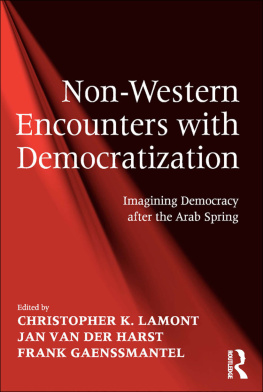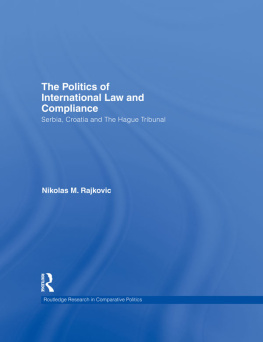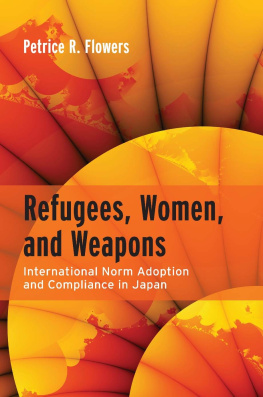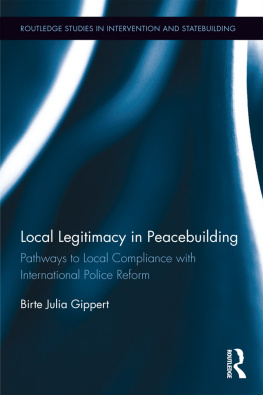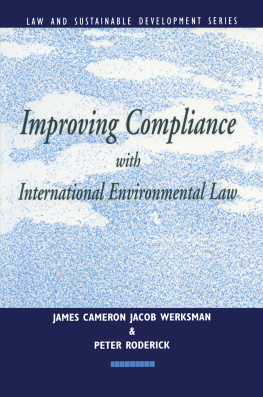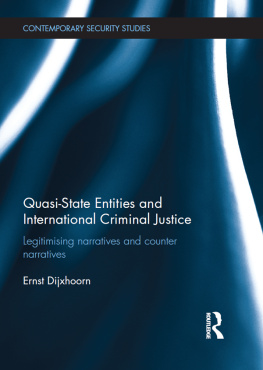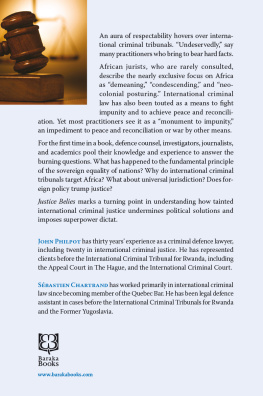INTERNATIONAL CRIMINAL JUSTICE AND THE POLITICS OF COMPLIANCE
For Korana and Tyler
International Criminal Justice and the Politics of Compliance
CHRISTOPHER K. LAMONT
University of Ulster, UK
ASHGATE
Christopher K. Lamont 2010
All rights reserved. No part of this publication may be reproduced, stored in a retrieval system or transmitted in any form or by any means, electronic, mechanical, photocopying, recording or otherwise without the prior permission of the publisher.
Christopher K. Lamont has asserted his right under the Copyright, Designs and Patents Act, 1988, to be identified as the author of this work.
Published by
Ashgate Publishing Limited
Wey Court East
Union Road
Farnham
Surrey, GU9 7PT
England
Ashgate Publishing Company
Suite 420
101 Cherry Street
Burlington
VT 05401-4405
USA
www.ashgate.com
British Library Cataloguing in Publication Data
Lamont, Christopher K.
International criminal justice and the politics of compliance.
1. International Tribunal for the Prosecution of Persons
Responsible for Serious Violations of International
Humanitarian Law Committed in the Territory of the Former
Yugoslavia since 1991. 2. Criminal justice, Administration of. 3. International obligations. 4. War crime trials-
Former Yugoslav republics. 5. Jurisdiction (International law)
I. Title
341.69-dc22
Library of Congress Cataloging-in-Publication Data
Lamont, Christopher K.
International criminal justice and the politics of compliance / by Christopher K. Lamont.
p. cm.
Includes bibliographical references and index.
ISBN 978-0-7546-7965-3 (hardback) -- ISBN 978-0-7546-9921-7 (ebook)
1. International criminal courts--Former Yugoslav republics. 2. Criminal justice, Administration of--International cooperation. 3. International offenses--Former Yugoslav republics. I. Title.
KZ6304.L36 2009
341.6909497--dc22
2009038694
ISBN 9780754679653 (hbk)
ISBN 9780754699217 (ebk)
ISBN 9781409499602 (ebk-ePUB)

Printed and bound in Great Britain by TJ International Ltd, Padstow, Cornwall
Contents
List of Figures and Tables
Figures
Tables
List of Abbreviations
BiH | Bosnia-Herzegovina |
DPA | Dayton Peace Agreement |
DS | Democratic Party (Demokratska stranka) |
DSS | Democratic Party of Serbia (Demokratska stranka Srbije) |
EU | European Union |
EUSR | European Union Special Representative |
FBiH | Federation of Bosnia and Herzegovina |
HDZ | Croatian Democratic Union (Hrvatska demokratska zajednica) |
ICC | International Criminal Court |
ICTR | International Criminal Tribunal for Rwanda |
ICTY | International Criminal Tribunal for the former Yugoslavia |
IEBL | Inter-entity Boundary Line |
IFOR | Implementation Force |
IHL | International Humanitarian Law |
IL | International Law |
ILC | International Law Commission |
IPTF | International Police Task Force |
IR | International Relations |
JIAS | Joint Interim Administrative Structures |
KFOR | Kosovo Force |
KTC | Kosovo Transitional Council |
LDK | Democratic League of Kosovo (Lidhja Demokratike e Kosovs) |
NATO | North Atlantic Treaty Organization |
NLA | National Liberation Army |
OFA | Ohrid Framework Agreement |
OHR | Office of the High Representative |
OSCE | Organization for Security and Cooperation in Europe |
OTP | Office of the Prosecutor within the International Criminal Tribunal for the former Yugoslavia |
PDK | Democratic Party of Kosovo (Partia Demokratike e Kosovs) |
RS | Republika Srpska (Bosnian Serb Republic) |
SAA | Stability and Association Agreement |
SDP | Social Democratic Party |
SFOR | Stabilization Force |
SiCG | State Union of Serbia and Montenegro (Dravna zajednica Srbija i Crna Gora) |
SKH | League of Communists of Croatia (Savez komunista Hrvatske) |
SKS | League of Communists of Serbia (Savez komunista Srbije) |
SPS | Socialist Party of Serbia (Socijalistika partija Srbije) |
SRJ | Federal Republic of Yugoslavia (Savezna republika Jugoslavije) |
SRSG | Special Representative of the Secretary General |
SSM | Social Democratic Union of Macedonia (Socijaldemokratski Sojuz na Makedonija) |
UK | Kosovo Liberation Army (Ushtria limatare e Kosovs) |
UNMIK | United Nations Mission in Kosovo |
UNPREDEP | United Nations Preventative Deployment to Macedonia |
UNSC | United Nations Security Council |
UNTAES | United Nations Transitional Administration Eastern Slavonia |
VMRO-DPMNE | Internal Macedonian Revolutionary Organization Democratic Party for Macedonian National Unity (Vnatreno Makedonska Revoluciona Organizacija Demokratska Partija za Makedonsko Nacionalno Edinstvo) |
Preface
We are in Your Hands
In December 1998 the president of the International Criminal Tribunal for the former Yugoslavia (ICTY), Gabriella Kirk McDonald, reported the Federal Republic of Yugoslavia to the United Nations Security Council for unabashedly breaching its obligations to the Tribunal under Security Council Resolutions 827, 1160, 1199, 1203, and 1207. After detailing Belgrades litany of non-compliance acts, which included the denial of visas to ICTY personnel, Kirk McDonald urged the Council to take enforcement action. She pleaded, not only does the Tribunal depend upon you, all member States look to you for the exercise of your Chapter VII authority which they ceded to you with the adoption of the UN Charter. We are in your hands. Despite Kirk McDonalds testimony, the Security Council failed to confront Belgrades non-compliance with Tribunal orders. Instead Belgrades recalcitrance persisted throughout 1999 and hardened during the course of NATOs Operation Allied Force. Then, in the midst of NATOs 78 day air campaign for Kosovo and six months after Kirk McDonald appeared before the UNSC, ICTY Chief Prosecutor Louise Arbour secured the certification of an indictment against Yugoslav President Slobodan Miloevi. The indictment of a sitting head of state by an international criminal tribunal was an ambitious act given that recalcitrant local governments across the former Yugoslavia proved reluctant to transfer lowly members of municipal police forces or low ranking military officers. Needless to say the prospect of a sitting head of state taking up residence at the Tribunals Scheveningen detention facility on the outskirts of The Hague seemed a remote prospect in 1999, even for those working within the Tribunals Office of the Prosecutor.
Next page

